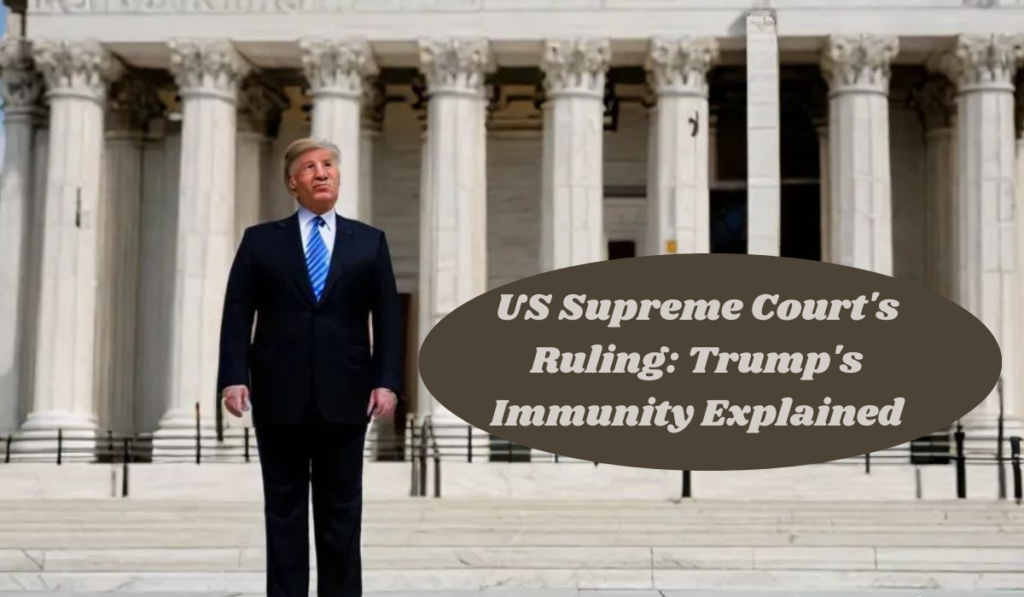Key Decision on Presidential Immunity
On Monday, the US Supreme Court delivered a landmark ruling regarding the legal accountability of former President Donald Trump. The Court determined that Trump cannot be prosecuted for actions carried out while he was in office as President, establishing a precedent for presidential immunity from criminal prosecution during a president’s term.
This decision underscores the principle that actions taken by a sitting president within the scope of their official duties are protected from legal challenge, reflecting a longstanding concept of executive immunity. However, the ruling also clarified that this immunity does not extend to personal actions taken outside the scope of presidential duties. Consequently, Trump can still be held accountable for any personal conduct or actions that occurred outside the realm of his official presidential responsibilities.
This ruling represents the Court’s first formal acknowledgment of presidential immunity from prosecution, setting a significant legal precedent that balances the need for executive protection with accountability for personal misconduct.
The decision has far-reaching implications for how future legal challenges involving sitting and former presidents will be approached, shaping the landscape of presidential accountability and legal responsibility.
Main Points of the Ruling
- Immunity for Official Acts: The court decided that Trump is protected from prosecution for his official duties as president.
- No Immunity for Private Acts: He can be prosecuted for actions that are not related to his official role.
- Ruling Majority: The decision was made by a 6-3 vote, with the conservative justices in favor.
- Further Review Required: The case will return to lower courts to examine specific actions.
Background of the Case
The ruling overturned a lower court’s decision that had rejected Trump’s claim of immunity. Trump’s case involved:
- Discussions with the Justice Department: Related to efforts to challenge the 2020 election results.
- Pressure on Mike Pence: Attempts to prevent the certification of Joe Biden’s victory.
- Fake Electors Scheme: Alleged involvement in creating false pro-Trump electors.
- January 6 Capitol Attack: His actions during the attack on the US Capitol.
The court found Trump has absolute immunity for his conversations with the Justice Department but left other issues for lower courts to decide.
Impact on Trump and the Election
Trump celebrated the ruling as a win for the Constitution and democracy. However, the court’s slow handling of the case could delay any trial beyond the upcoming election. This decision could affect Trump’s ongoing legal battles and his candidacy against Biden in the 2024 election.
Dissenting Opinion
Justice Sonia Sotomayor, along with Justices Elena Kagan and Ketanji Brown Jackson, strongly disagreed with the ruling. They argued that it undermines the principle that no one, including a president, is above the law.
Legal Perspectives
Legal experts are divided. Rick Hasen, a law professor, noted that the ruling favors presidential immunity and may delay proceedings until after the election. Trump’s lawyers argued that without immunity, presidents could be vulnerable to political attacks through the threat of future prosecution.
Charges Against Trump
Special Counsel Jack Smith has charged Trump with multiple crimes related to election interference. Trump has pleaded not guilty and claims the charges are politically motivated. Other charges against Trump include falsifying documents and keeping classified records after leaving office.
Historical Significance
This ruling is the first time the Supreme Court has declared that former presidents may have immunity from criminal charges for their official acts. The decision sets a precedent and may shape how future presidents are treated regarding legal accountability.
Next Steps
The case will continue in the lower courts to determine the extent of Trump’s immunity for the remaining allegations. As of now, no trial date has been set, and the legal battle will likely extend into the election period.
Conclusion
The Supreme Court’s decision highlights the complex balance between presidential immunity and accountability. As Trump faces multiple legal challenges, this ruling will play a crucial role in how these cases unfold and their impact on his political future.
Table of Contents
References
- Reuters: US Supreme Court Rules on Trump’s Immunity
- Nation: Trump’s Immunity Decision

